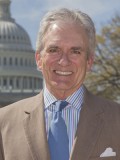By Executive Director J. Brent Walker

Religious liberty goes hand-in-hand with the cause of social justice. From colonial days to the present, Baptists, at their best, have fought for both principles.
Harvard College and early Baptists had an inauspicious beginning: They didn’t get along at all. Founded in 1636, Harvard was the first institution of higher learning in America. It’s hard to believe that some of its founders were not involved in the General Court of Massachusetts’ edict to banish proto-Baptist Roger Williams in 1635; but if not, surely they agreed with the decision to send him packing. Moreover, after Harvard’s first president — Henry Dunster — developed Baptist sentiments and openly opposed infant baptism, the General Court forced him to resign in 1654.
I got a much more hospitable welcome when I participated in the inaugural symposium of the Ambassador John L. Loeb Jr. Initiative on Religious Freedom and Its Implications at Harvard. My two days on campus were absolutely delightful. Along with Sheikh Yasir Qadhi and Rabbi Angela Buchdahl, we discussed a wide range of religious liberty issues, including how to facilitate the fulsome tapestry of American religious pluralism. The panel discussion was moderated by Professor Henry Louis Gates Jr., a gracious, winsome and insightful host. Click here for a recap of the event.
For my part, I offered the three Rs of civic engagement — rights, responsibility and respect — as a helpful way to think about promoting mutual toleration and a civil public square. We should cherish the rights with which we are blessed by the hand of God. We also must take seriously the responsibility to exercise our rights wisely and promote the common good. And, it is crucial that we respect others by according them the same rights we want for ourselves.
This idea of exercising our rights responsibly with respect for others acts as a bridge to connect religious liberty to social justice. Justice is promoted when we treat each other with respect and when the government treats each citizen fairly. Indeed, this Harvard conversation was something of a prelude to the theme of the Alliance of Baptists Annual Gathering that I attended the following weekend at the Williston-Immanuel United Church in Portland, Maine. Its theme was to promote “One New Humanity” through cultivating justice in a multicultural world.
In my workshop, we focused on the relationship between religious liberty and justice. When it comes to the rights we want government to ensure for ourselves, we must be willing to fight to extend those same rights to others. Stated differently, the religious liberty that we enjoy personally and individually must issue in an ethical mandate of liberty and justice for all — institutionally and universally.
We discussed the religious liberty cases pending in the U.S. Supreme Court. Town of Greece v. Galloway (see cover story) involved legislative prayer — mostly Christian prayers — at municipal meetings where citizens had gathered not just to observe, but to participate in the official town business. We discussed how government-sponsored religious exercises in that context not only violate the Establishment Clause, but they treat religious minorities and non-religious citizens unfairly. Many in the group thought a moment of silence was an appropriate way to have a win/win solution. A narrow majority of the Court, of course, disagreed.
We explored how requests for governmental accommodation of the exercise of religion must be tempered with concern for any prejudice such accommodation might visit upon other citizens. Should the religious choices of the owners of a for-profit corporation trump an employee’s access to a generally available government benefit? This is the difficult balance that the Supreme Court is presently seeking to perform as it deliberates a decision in the case of Sebelius v. Hobby Lobby Stores, Inc.
The High Court has agreed to review, but has not yet received briefs or heard arguments in, a case involving a claim of a Muslim prisoner in Arkansas who wants to be allowed to grow and keep a beard for religious reasons (Holt v. Hobbs). Incarcerated persons are some of the most vulnerable people among us, and special care must be taken to ensure their religious needs are met, within the bounds of the need for discipline and order in our prison system.
These cases dealing with religious liberty cannot be divorced from the larger societal context and the Kingdom of God. No one in our generation has tried harder to connect these dots between the rights of conscience and social justice than the late Glen Stassen, my ethics professor at Southern Seminary and — for the past 18 years — professor at Fuller Theological Seminary in Pasadena, Calif. Dr. Stassen inspired me, and many others, in the classroom and through his books, to take seriously the Sermon on the Mount and to fully appreciate the radical mandates of the gospel.
We are all terribly saddened by Dr. Stassen’s untimely death on April 26. But we can carry forward his life work and legacy by fighting for freedom and using that freedom to make the world a more just planet on which to live.
From the May 2014 Report from the Capital. Click here for the next article.





